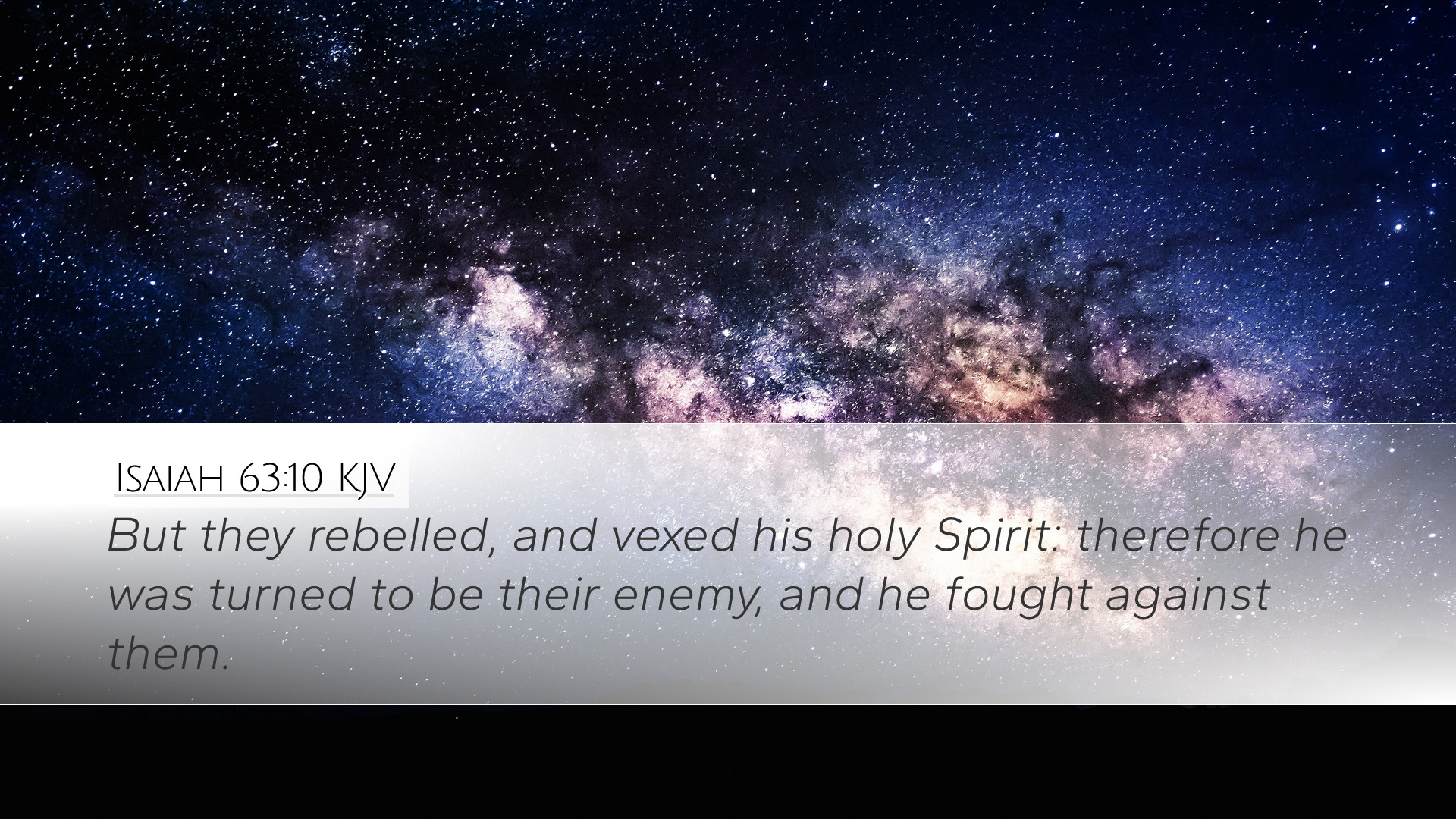Isaiah 63:10 - Commentary
Verse Text: "But they rebelled and grieved his holy Spirit; therefore he turned to be their enemy, and himself fought against them."
Overview
Isaiah 63:10 is set within a profound reflection on God's relationship to His people, addressing themes of rebellion, divine judgment, and the ongoing nature of God's love despite human disobedience. This verse serves as a poignant reminder of the consequences of straying from God's ways.
Contextual Background
The book of Isaiah is filled with prophecies concerning Israel's unfaithfulness and the resulting consequences. This specific passage comes after a beautiful depiction of God's salvation and mercy toward His people. The mention of the 'holy Spirit' indicates that the grieving is not merely a slight against God but a deep, personal wound against His presence and influence in the life of Israel.
Thematic Exploration
- Rebellion Against God:
The verse emphasizes Israel's rebellion. Just as Matthew Henry notes in his commentary, rebellion is not only a sin but a conscious decision against God’s authority. This rebellion led to a estrangement from God, which is a recurring theme throughout the Scriptures.
- Grieving the Holy Spirit:
Albert Barnes highlights the seriousness of grieving the Holy Spirit. The Spirit is central to God’s work among His people, and to grieve Him is to reject divine guidance and to pursue paths of sin. This indicates a profound relational breach that leads to dire consequences.
- Consequences of Sin:
The second part of the verse speaks of God turning against His people. Adam Clarke elaborates that this underscores God's judgment against unfaithfulness. It serves as a sobering reminder that God’s patience has limits, and persistent disobedience invites divine opposition.
- Divine Discipline:
In the context of loving discipline, the notion of God fighting against His people can also be viewed as an act of divine correction, intended to bring them back to repentance. This theme of discipline is significant throughout both Testaments, as seen in Hebrews 12, where the Lord disciplines those He loves.
Detailed Commentary
Rebellion: The Hebrew word used for "rebelled" (מָרוּ) indicates a turning away or an act of defiance towards God. Henry notes that this defiance is often not just individual but collective, indicating a societal departure from God's commandments. The apostasy described is tragic, primarily because it is coupled with the intentionality of grieving God's Spirit.
Grieving the Holy Spirit: The term 'grieved' in this context signifies a deep emotional pain caused by betrayal. Barnes explains that an essential aspect of the Holy Spirit's role is to bring about conviction and guide to righteousness, and when the people reject this influence, they reject their only source of hope and truth.
Divine Retribution: The imagery of God turning to become their enemy is striking. Clarke emphasizes that this does not mean that God's nature changes but that His actions reflect the necessity of justice. The formidable reality is that God cannot overlook rebellion against His holiness. It is a grave warning that disobedience incurs severe penalties, distancing one from God's grace.
Theological Implications
This verse illustrates profound theological truths about the nature of God’s covenant with His people. The passage brings to light the expectations that accompany this relationship: fidelity and obedience. Failure to uphold these principles results in estrangement from God. Scholars emphasize that this verse serves as an important lesson in the need for continual faithfulness to God’s calling.
Applications for Today
- Self-Examination:
Pastors and believers are encouraged to examine their own hearts for areas of rebellion against God. Understanding how easy it is to grieve the Holy Spirit fosters a desire for repentance and restoration.
- Responsibility of Leadership:
Leaders in the church must take head this warning concerning rebellion. It serves as a reminder of their responsibility to guide their congregants in truth and prevent the grieving of the Spirit through unfaithfulness.
- Hope and Restoration:
While this passage depicts grim realities, it also offers hope. God's desire is to reconcile with His people. The narrative of Israel's history emphasizes that though they stray, God's mercies are new every morning for those who seek Him with a repentant heart.
Conclusion
Isaiah 63:10 stands as a significant reminder of the grave outcomes of rebellion against God. It encapsulates the tension between divine judgment and grace, underscoring the need for faithfulness and the dangers of grieving the Holy Spirit. For contemporary readers—pastors, students, theologians, and scholars—it is an urgent call to cultivate a life attuned to the Spirit, guarding against rebellion, while embracing the hope of God’s unchanging love and the possibility of restoration.


